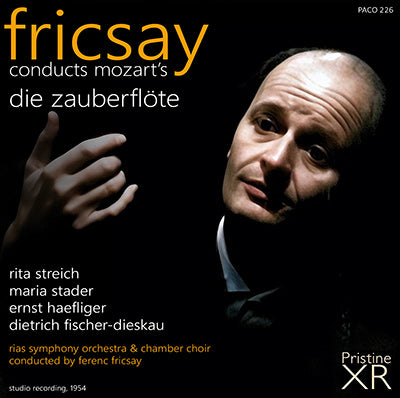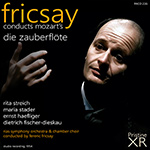
This album is included in the following sets:
This set contains the following albums:
- Producer's Note
- Full Track Listing
- Cover Art
Fricsay approached The Magic Flute not as a folkloric fantasy but as a work of profound philosophical and emotional depth. A conductor deeply rooted in both operatic and symphonic traditions, he emphasised textual clarity, rhythmic transparency, and dramatic pacing. In his hands, Mozart’s music flows with a natural grace that serves both the narrative and its symbolic architecture. Every phrase is shaped with care, yet the overall result feels spontaneous and full of life.
Central to the success of this recording is the conductor’s inspired casting. As Tamino, Swiss tenor Ernst Haefliger brings a refined lyricism and poetic sensibility to the role. His voice, elegant and emotionally nuanced, perfectly suits the prince’s journey from confusion to enlightenment. Opposite him, the Swiss-Hungarian soprano Maria Stader sings Pamina with radiant tone and exquisite delicacy. Her “Ach, ich fühl’s” is a highlight of the recording—unforced, deeply felt, and heartbreaking in its simplicity.
Rita Streich, a soprano of sparkling clarity, tackles the Queen of the Night’s fearsome arias with apparent ease. Her precision and control are matched by a cool, shimmering tone that captures the queen’s regal poise as well as her icy menace. While her voice may not possess the explosive power often associated with this role, Streich offers a portrayal of unsettling serenity—more serpent than storm.
One of the most celebrated aspects of this recording is the presence of Dietrich Fischer-Dieskau as Papageno. At the time best known for his lieder singing, Fischer-Dieskau brings rare vocal finesse and emotional range to the bird-catcher. His Papageno is more than a comic sidekick: he is a man of real feeling, charm, and melancholy, delivered with disarming directness and humour. His scenes with Lisa Otto’s bright and delightful Papagena sparkle with charm and warmth, offering one of the most human portrayals of their duet on record.
As Sarastro, Josef Greindl delivers a sonorous, imposing performance, his cavernous bass perfectly matched to the character’s moral authority. There is gravity and serenity in his portrayal, though never pomposity. In “In diesen heil’gen Hallen,” he projects not just authority but a deep sense of compassion. Kim Borg’s eloquent Speaker adds further depth to the Masonic order’s representatives, embodying the values of reason and brotherhood with quiet dignity.
The RIAS Symphony Orchestra and Chamber Choir—both under Fricsay’s regular direction—perform with clarity, discipline, and expressive warmth. The orchestral textures are clean and alert, with winds and brass particularly well-balanced. Fricsay's command of pacing ensures that the many shifts in mood and style throughout the opera unfold seamlessly. The ceremonial grandeur of the choruses contrasts vividly with the intimacy of the duets and the sparkle of the comic numbers.
Crucially, the performance gives full weight to the opera’s Singspiel form. The spoken dialogue, often a stumbling block in recordings, is delivered with brisk authority and a strong sense of character. Fricsay ensures that dramatic momentum is never lost, and the result feels as much like a stage performance as a studio creation.
In its balance of seriousness and wit, theatrical energy and musical refinement, this 1954 Zauberflöte remains one of the most persuasive interpretations on disc. It speaks of an age when opera recording was not just documentation but a form of art in itself—when casting, conducting, and production aligned around a singular artistic vision.
Ferenc Fricsay’s Magic Flute remains fresh not because it is novel or eccentric, but because it draws so faithfully and vividly on the heart of Mozart’s intentions. This is an opera about the triumph of wisdom, compassion, and human understanding—and this recording brings those ideals luminously to life.
FRICSAY Mozart - Die Zauberflöte, K. 620
disc one (65:16)
ACT ONE
1. Ouvertüre (6:44)
2. Zu Hilfe! Zu Hilfe! (6:40)
3. Der Vogelfänger bin ich ja (2:46)
4. He da! (3:09)
5. Dies Bildnis ist bezaubernd schön (3:55)
6. Rüste dich mit Mut und Standhaftigkeit (0:47)
7. O zittre nicht, mein lieber Sohn (5:01)
8. Hm! hm! hm! hm! (6:09)
9. Du feines Täubchen, nur herein (1:38)
10. Bin ich nicht ein Narr (1:27)
11. Bei Männern, welche Liebe fühlen (2:31)
12. Zum Ziele führt dich diese Bahn (1:34)
13. Die Weisheitslehre dieser Knaben (2:05)
14. Wo willst du kühner Fremdling hin? (6:35)
15. Wie stark ist nicht dein Zauberton (3:14)
16. Schnelle Füsse, rascher Mut (3:05)
17. Es lebe Sarastro! Sarastro lebe! (1:41)
18. Herr, ich bin zwar Verbrecherin (5:07)
19. Wenn Tugend und Gerechtigkeit (1:08)
disc two (77:27)
ACT TWO
1. Marsch der Priester (2:34)
2. Ihr, eingeweihte Diener (2:42)
3. O Isis und Osiris (3:15)
4. Papageno! Wo denkst du, dass wir uns befinden? (2:30)
5. Bewahret euch vor Weibertücken (1:08)
6. Wie? Wie? Wie? (3:34)
7. Alles fühlt der Liebe Freuden (1:57)
8. Der Hölle Rache kocht in meinem Herzen (2:59)
9. Morden soll ich? (1:04)
10. In diesen heil'gen Hallen (4:13)
11. Hier seid ihr euch beide allein überlassen (2:40)
12. Seid uns zum zweiten Mal willkommen (1:46)
13. Tamino, wollen wir nicht speisen? (1:07)
14. Ach, ich fühl's (4:04)
15. O Isis und Osiris, welche Wonne! (3:16)
16. Tamino! Dein Betragen war bis hieher männlich (0:47)
17. Soll ich dich, Teurer, nicht mehr sehen? (2:38)
18. Tamino! Willst du mich denn gänzlich verlassen? (0:59)
19. Ein Mädchen oder Weibchen (3:45)
20. Da bin ich schon, mein Engel! (1:07)
21. Bald prangt, den Morgen zu verkünden (5:27)
22. Der, welcher wandert diese Straße voll Beschwerden (8:02)
23. Wir wandelten durch Feuersgluten (3:21)
24. Papagena! Papagena! Papagena! (7:12)
25. Nur stille, stille, stille (5:21)
CAST
Tamino - Ernst Haefliger
Papageno - Dietrich Fischer-Dieskau
Königin der Nacht - Rita Streich
Sprecher - Kim Borg
Pamina - Maria Stader
Sarastro - Josef Greindl
Monostatos - Martin Vantin
Papagena - Lisa Otto
1er Geharnischter - Howard Vandenburg
2er Geharnischter - Kim Borg
Erste Dame - Marianne Schech
Zweite Dame - Liselotte Losch
Dritte Dame - Margarete Klose
Erster Knabe - Margot Guillaume
Zweiter Knabe - Maria Reith
Dritter Knabe - Diana Eustrati
RIAS Kammerchor & RIAS-Symphonie-Orchester
conducted by Ferenc Fricsay
Recorded in June 1954 at Jesus-Christus-Kirche, Berlin
Ambient Stereo XR remastering: Andrew Rose
Cover artwork based on a photograph of Ferenc Fricsay
Total duration: 2hr 22:44

